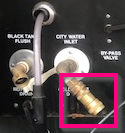I agree it looks like a cheap inline regulator, they work sort of ok to protect plumbing, but are limited in their accuracy and have limited flow, you might want to upgrade to an adjustable one with a pressure gauge on it, available for about $25 on amazon under a number of brand names such as https://smile.amazon.com/Esright-Pressure-Regulator-Lead-Free-Adjustable/dp/B075RRCWGD/
Also note some RV's have pressure regulators built into the water inlet, they look something like this https://smile.amazon.com/SHURFLO-183-029-18-White-Pressure-Regulated/dp/B00074QUDU/ of course these do not protect the water hose only the interior plumbing
p.s. for safety sake I generally don't leave city water turned on at my coach, I only use it to refill the onboard tanks, and turn off my water pump when I am leaving the coach for the day, that way something like a toilet valve leak can't over flow my black tank and flood the coach while I am gone.

